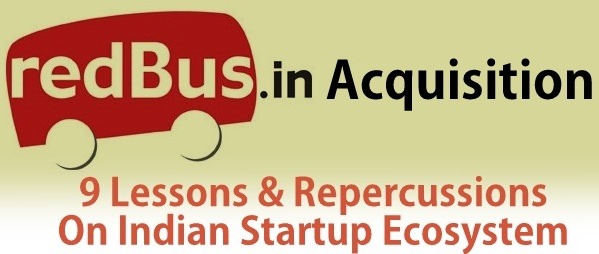Inarguably, the biggest deal in the media circles over the weekend, as far as the Indian Startup Ecosystem is concerned, was the news of redBus being acquired. For those of you who still haven’t heard the news (most probably because you’ve been living in a cave for the past 3 days), the Bangalore based Internet Startup that has revolutionized the highly unorganized bus-ticketing system, is rumored* (still waiting for an official word from redBus) to be in talks with the ibibo Group, a joint venture by South-African business group Naspers and Chinese Internet giant Tencent, for a 800 Cr ($140 mn) buyout.
The social media was abuzz with praise and accolades, and yours truly, although in no way associated with the company, (other than being a smitten fan boy) was gleaming with joy throughout the day.
And why not? They are deserving of all the success and the money that has come along with it.
Already being heralded as the biggest Indian Internet success story of our era, here are 9 possible effects / lessons that this rumored acquisition could have on the ecosystem.

Contents
A shot in the arm for all Startups
This is all the inspiration and motivation that many of the small companies need right now; to be able to set a vision for themselves and to be able to really believe that what they are doing could actually be worthwhile in a few years.
This would also mean that they now have someone to idolize and look up to. If not anything else, it would be a welcome change to talk about an Indian success story rather than listening to the Silicon Valley anecdotes.
Boost to Investor Confidence
The very fact that it is a foreign conglomerate that is going to be acquiring redBus, would definitely boost the image of the Indian ecosystem, not only in the local investors, but also bring it into the field of vision of a few big name foreign investors.
Also, such a superb exit for Seedfund, Helion Ventures etc could mean that early-stage seed funds and angel investors would open up their pockets a little bit more, which would in turn bode well for a few deserving startups.
Encouragement to build Product Startups
If not clear already, this deal helps reinforce the notion that while it might be easier to build service companies, it is definitely easier* (relatively speaking) to scale product-based companies. So, rather than going for the beaten path, many entrepreneurs might take the leap and for the benefit of the whole ecosystem, we might be able to deliver more awesome product companies.
Birth of 3-4 Potentially disruptive Startups
“Once an entrepreneur, always an entrepreneur.”
I won’t be surprised if the core team comes together again and starts from scratch to build another amazing product, or takes up other challenging problems. In fact, a ‘healthy’ amount of cash would just help them in taking a few of their ideas forward. It is no secret that quite a few of the world’s best startups have been built by ex-googlers.
Similarly, I expect groups of 3-4 people teaming up and starting to build upon their own ideas, in the months to come. With the experience and the stamp of approval, life would become much easier for them as well.
A vote of Confidence to those who want to work for Startups
There is no doubt that the early employees will be reaping rich rewards once the deal is done. This would help quell some of the doubts that talented folks elsewhere are grappling with. The monetary, and more importantly, the probable recognition would be strong factors in tilting their decisions in the startup’s favor.
And what are the lessons that we learn from this Acquisition? Here are 3 that I take away
Lesson #1- Solve a Real problem, not a sexy problem
I’ve heard Dave McClure say it in-person, at Geeks on a Plane meetup. I have heard Vishal Gondal say it in-person at Unpluggd. If there wasn’t proof enough, this would help clinch the debate in favor of the statement.
redBus co-founders had to completely change the convention along with the mindset of the public which was used to traditional bricks and mortars travel agents. They even distributed pamphlets for redBus at busy traffic intersections and bus stations, many times after working a hard day; late into the night upto 12 midnight.
Doing this was definitely, not sexy. But it was real. The highly fragmented and unorganized sector is now a simple and easy to use bus ticketing portal.
Lesson #2- Listen to what your customers have to say
I had dropped in unannounced into the redBus office on one random day, March 4th. And, I was completely amazed by the product team at redBus. They actually wanted to know my pain points and listened to me intently.
Lesson #3- Build a moat around your product
Many ticketing portals sprang up in the wake of redBus’ success, but none could quite match up in duplicating their success.
Why?
Because redBus did not just build a ticketing portal. They cared about their customers. They cared about the bus operators and went and spoke to both sides to decipher their pain points.
They built a strong ecosystem around the product, so much so that they could dictate terms, all this while being a single entity, against a 1000 or so bus operators.
General Happiness and a Sense of Achievement
Other than the above mentioned points, what I and hopefully, many other people got was a sense of pure elation and contentment; a signal of sorts for the better things yet to come. It always feels nice to know that hard work and years of sacrifice and pain doesn’t go in vain.
